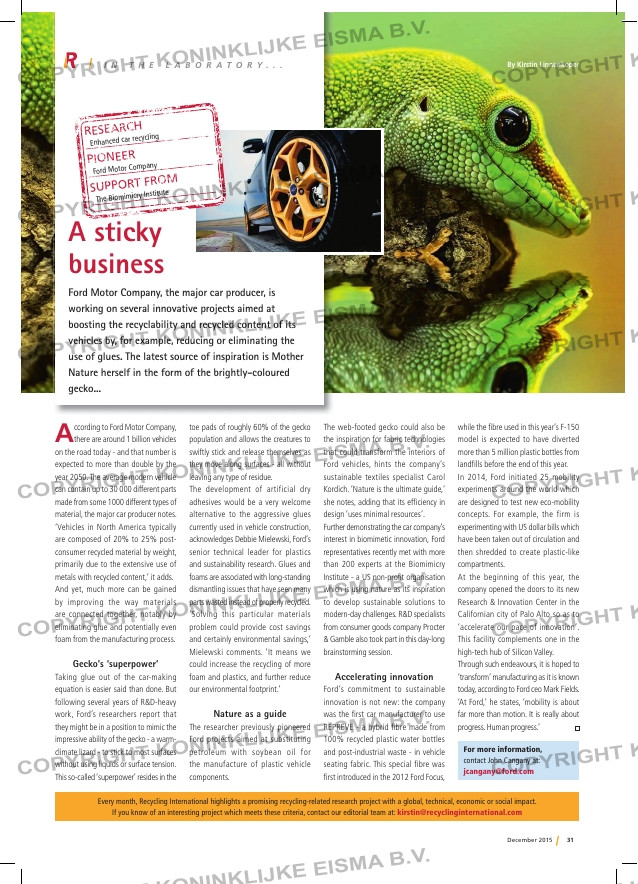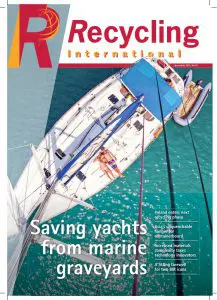Page 33 from: December 2015

31December 2015
I N T H E L A B O R A T O R Y . . .
According to Ford Motor Company, there are around 1 billion vehicles
on the road today – and that number is
expected to more than double by the
year 2050. The average modern vehicle
can contain up to 30 000 different parts
made from some 1000 different types of
material, the major car producer notes.
‘Vehicles in North America typically
are composed of 20% to 25% post-
consumer recycled material by weight,
primarily due to the extensive use of
metals with recycled content,’ it adds.
And yet, much more can be gained
by improving the way materials
are connected together, notably by
eliminating glue and potentially even
foam from the manufacturing process.
Gecko’s ‘superpower’
Taking glue out of the car-making
equation is easier said than done. But
following several years of R&D-heavy
work, Ford’s researchers report that
they might be in a position to mimic the
impressive ability of the gecko – a warm-
climate lizard – to stick to most surfaces
without using liquids or surface tension.
This so-called ‘superpower’ resides in the
toe pads of roughly 60% of the gecko
population and allows the creatures to
swiftly stick and release themselves as
they move along surfaces – all without
leaving any type of residue.
The development of artificial dry
adhesives would be a very welcome
alternative to the aggressive glues
currently used in vehicle construction,
acknowledges Debbie Mielewski, Ford’s
senior technical leader for plastics
and sustainability research. Glues and
foams are associated with long-standing
dismantling issues that have seen many
parts wasted instead of properly recycled.
‘Solving this particular materials
problem could provide cost savings
and certainly environmental savings,’
Mielewski comments. ‘It means we
could increase the recycling of more
foam and plastics, and further reduce
our environmental footprint.’
Nature as a guide
The researcher previously pioneered
Ford projects aimed at substituting
petroleum with soybean oil for
the manufacture of plastic vehicle
components.
The web-footed gecko could also be
the inspiration for fabric technologies
that could transform the interiors of
Ford vehicles, hints the company’s
sustainable textiles specialist Carol
Kordich. ‘Nature is the ultimate guide,’
she notes, adding that its efficiency in
design ‘uses minimal resources’.
Further demonstrating the car company’s
interest in biomimetic innovation, Ford
representatives recently met with more
than 200 experts at the Biomimicry
Institute – a US non-profit organisation
which is using nature as its inspiration
to develop sustainable solutions to
modern-day challenges. R&D specialists
from consumer goods company Procter
& Gamble also took part in this day-long
brainstorming session.
Accelerating innovation
Ford’s commitment to sustainable
innovation is not new: the company
was the first car manufacturer to use
REPREVE – a hybrid fibre made from
100% recycled plastic water bottles
and post-industrial waste – in vehicle
seating fabric. This special fibre was
first introduced in the 2012 Ford Focus,
while the fibre used in this year’s F-150
model is expected to have diverted
more than 5 million plastic bottles from
landfills before the end of this year.
In 2014, Ford initiated 25 mobility
experiments around the world which
are designed to test new eco-mobility
concepts. For example, the firm is
experimenting with US dollar bills which
have been taken out of circulation and
then shredded to create plastic-like
compartments.
At the beginning of this year, the
company opened the doors to its new
Research & Innovation Center in the
Californian city of Palo Alto so as to
‘accelerate our pace of innovation’.
This facility complements one in the
high-tech hub of Silicon Valley.
Through such endeavours, it is hoped to
‘transform’ manufacturing as it is known
today, according to Ford ceo Mark Fields.
‘At Ford,’ he states, ‘mobility is about
far more than motion. It is really about
progress. Human progress.’
A sticky
business
Ford Motor Company, the major car producer, is
working on several innovative projects aimed at
boosting the recyclability and recycled content of its
vehicles by, for example, reducing or eliminating the
use of glues. The latest source of inspiration is Mother
Nature herself in the form of the brightly-coloured
gecko…
By Kirstin Linnenkoper
Every month, Recycling International highlights a promising recycling-related research project with a global, technical, economic or social impact.
If you know of an interesting project which meets these criteria, contact our editorial team at: [email protected]
For more information,
contact John Cangany at:
[email protected]
RESEARCH
PIONEER
SUPPORT FR
OM
Enhanced car
recycling
Ford Motor Co
mpany
The Biomimicr
y Institute



